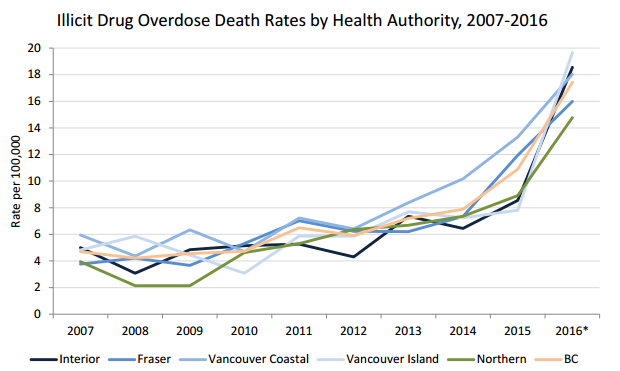In response to the province’s escalating overdose crisis, BC Health Officer Dr. Perry Kendall would like to see a drug called suboxone used more widely to treat people with opioid addictions.
“It is a safer drug. It’s used in about 85% of the cases in France so we’re trying to transition to the safer drug. We worked with the College of Physicians and Surgeons to delink suboxone from needing a methadone maintenance treatment license.”
Suboxone is also less prone to abuse than the more widely used methadone, says Kendall who believes physicians need more training to be better able to treat people with addictions.
Kendall says he is working with the College of Physicians to allow nurse practitioners to start suboxone prescriptions for appropriate patients. As of January, nurse practitioners in the province will be able to continue existing prescriptions of suboxone.
Kendall says prescriptions of safe opiates are another effective avenue for treating entrenched addiction.
“It is part of the access that people have in Europe. We have a small program here and I think it needs to be expanded.”
The federal government recently simplified the approval process for safe consumption sites, a move Kendall applauds.
“Giving oversight to an injection does not butt up against the Controlled Drugs and Substances act. What we wanted to do was put people who were injecting in closer proximity with people who could identify an overdose and administer an injection and call 911.”
At a provincial level, a cold-weather strategy is aimed at helping hard hit communities prevent overdoses. Overdose prevention sites have been opened across the Lower Mainland, the interior and in Prince George.
Kendall is also part of a strategic advisory committee aimed at organizing a national response to the overdose crisis.
“It’s a similar structure to what we set up for H1N1 and to respond to Ebola virus. So we will soon have a national coordinating structure.”
The committee will be a joint effort between health care providers and law enforcement personnel.
BC Director of Police Services Clayton Pecknold says there’s federal government can do.
“We have vacancies in this province with respect to federal policing and drug enforcement. But I can tell you, on the provincial side, we have devoted a considerable amount of money into our provincial resource, where we don’t have vacancies and they’re doing this type of work.”
He estimates 25-30% of federal policing positions in BC are currently vacant.
Something going on in the Prince George area you think people should know about?
Send us a news tip by emailing [email protected].







